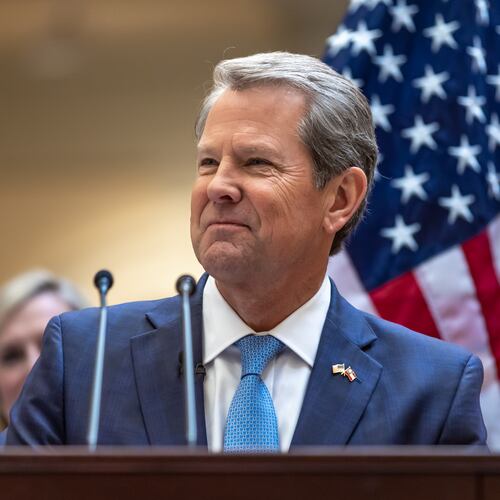Today’s newsletter highlights:
- State Supreme Court weighs voter veto power.
- Georgia’s Democratic U.S. senators are concerned about water quality.
- Attorney General Chris Carr warns about illegal e-cigarettes.
Outside money
Credit: Taylor Croft/AJC
Credit: Taylor Croft/AJC
U.S. Sen. Jon Ossoff made his name in national Democratic politics during his last two campaigns with a sharp message, aggressive style — and a knack for raising massive sums from outside Georgia.
His latest campaign report, released late Tuesday, shows how that formula hasn’t changed. Of his 33,000-plus donors listed in the disclosure, roughly nine out of 10 came from out of state, fueling his $11 million haul during the first three months of the year.
But that is only part of the picture. Ossoff’s report included itemized contributions — that is, mostly higher dollar donations to his campaign. Overall, the campaign said it had more than 348,000 donations and only 3% were itemized in the first quarter. So the report filed Tuesday only gives a glimpse of an operation it said was powered by small-dollar donors.
The surge in national cash reflects a new political reality in Georgia. As the state cements its status as a premier battleground, out-of-state money is no longer the exception. It’s fast becoming the norm.
Georgia Republicans, too, have increasingly leaned on non-Georgians for financial support and embraced a “50-state strategy” in the last two U.S. Senate campaigns. In the 2022 election, Republican Herschel Walker’s campaign boasted about garnering donations from nearly 50,000 donors from every U.S. state.
Ossoff’s campaign still played big in his home state. His campaign said he received donations from voters in 156 of Georgia’s 159 counties. The average overall contribution was $32.
He also reported $11 million in cash on hand as he prepares for a 2026 reelection bid — a race that could feature a challenge from Republican Gov. Brian Kemp, who is still weighing a run.
Things to know
Credit: Kelly Yamanouchi/AJC
Credit: Kelly Yamanouchi/AJC
Good morning! Gov. Brian Kemp has 28 days left to either sign or veto bills passed by the state Legislature this year. He’s signed eight bills into law so far and hasn’t vetoed anything yet.
Here are five things to know for today:
- Most Georgia taxpayers will get refunds of up to $500 later this spring under a law Gov. Brian Kemp signed on Tuesday. The AJC’s David Wickert reports taxpayers must have been full-year Georgia residents in 2023 and 2024 and filed income tax returns for both years to qualify.
- Raphael Bostic, president and CEO of the Federal Reserve Bank of Atlanta, urged caution amid uncertainty surrounding the Trump administration’s economic policies, the AJC’s Kelly Yamanouchi reports.
- The military will officially rename Fort Moore, the Army base outside of Columbus, as Fort Benning during a ceremony today, the AJC’s Jeremy Redmon reports. The Trump administration says the new Fort Benning is named after a World War I veteran, not the Confederate general that was the base’s previous namesake.
- The University System of Georgia’s Board of Regents voted Tuesday not to raise in-state undergraduate tuition rates, the AJC’s Jason Armesto reports.
- Everton Blair, the former board of education chair of Georgia’s largest school district is running to unseat U.S. Rep. David Scott in next year’s Democratic primary, Greg Bluestein reports.
Voter vengeance
When Georgia voters get angry with their political leaders’ decisions, they usually have just one recourse: vote them out. But what if there were another option?
The state Supreme Court today will consider whether voters can veto zoning ordinances passed by their local elected officials. The court ruled two years ago that voters could cancel some local government property purchases. But interpreting the state Constitution to say they can block zoning decisions would alter the political dynamic of what’s considered the fundamental function of local governments.
Georgia, like most other southern states, doesn’t usually let people legislate by referendum. But it’s become common in other places. Voters in California don’t even need their state Legislature to pass laws. If enough people sign a petition to qualify a proposal for the ballot, voters can pass their own laws — often to the chagrin of their elected representatives.
Georgia isn’t going that far. In this case, voters on Sapelo Island want to block an ordinance that would let developers build much larger homes. As our AJC colleague Adam Van Brimmer reports, that has alarmed the island’s Gullah Geechee community, who fear it would price them out of their homes.
The county warns of chaos if the referendum succeeds, arguing it would eliminate all zoning protections — opening the door for 10,000 square foot mansions. Attorneys for the Gullah Geechee community scoff at that, saying the zoning law would simply revert to the previous version.
Town hall chaos
Credit: Jenni Girtman for the AJC
Credit: Jenni Girtman for the AJC
Police ejected at least six people from U.S. Rep. Marjorie Taylor Greene’s town hall on Tuesday night, including two who were shocked with a Taser. Three people face criminal charges.
Greg Bluestein witnessed the chaotic scene up close. Greene, R-Rome, waved goodbye as protesters were thrown out during the roughly hourlong event. When she was able to talk, she praised President Donald Trump, criticized Democrats and attacked the news media.
She also answered prewritten questions from attendees, including some that criticized her politics and another that asked why she was “such a coward in the face of an obvious fascist takeover.”
Greene replied she’s “yet to see a fascist gathering. That doesn’t exist in the Republican Party.”
New guy
Credit: Courtesy photo
Credit: Courtesy photo
Tuesday was Nels Peterson’s first day presiding over oral arguments as Georgia’s chief justice, and he’s already making his mark on the state’s highest court.
Peterson is trying out a new policy giving lawyers up to two minutes of uninterrupted time to present their key points in the case before justices start asking them questions.
Arguing before the U.S. or state Supreme Courts can be intense. The justices often know the cases better than the lawyers do, having spent lots of time examining the lower-court record and reading the briefs filed by all sides.
With limited time for each case, the justices often aren’t interested in attorneys’ opening statements. Instead, they jump right in with questions that can be jarring for the unprepared.
This new policy gives lawyers a chance to build up a little momentum before the bombardment begins. The U.S. Supreme Court implemented a similar rule in 2019.
On Tuesday, attorney Josh Belinfante spoke for a full three minutes before being interrupted for a question.
“I’m glad they are trying the new rule on a trial basis,” Belinfante, an attorney with the Robbins law firm who frequently argues before the court, said in an email. “It allows advocates to attempt to identify issues that are most important to them, while still respecting the Court’s control over the issues.”
Murky waters
One casualty from the Department of Government Efficiency’s culling of federal properties appears to be the lease of the U.S. Geological Survey’s South Atlantic Water Science Center in Norcross. Now, Georgia’s Democratic U.S. Senators want to know what happens next.
Employees at the center maintain and monitor a series of gauges that measure the quality of much of Georgia’s drinking water. The gauges also help determine river flows for things like Georgia’s agriculture industry and nuclear reactors.
The Chattahoochee Riverkeeper, a nonprofit water advocacy group, fear terminating the lease could be the precursor to laying off these workers. Last week, U.S. Sens. Jon Ossoff and Raphael Warnock, both of Atlanta, sent a letter to Interior Secretary Doug Burgum asking just those questions.
“We are concerned about potential effects on drinking water quality and water supply across Georgia,” the senators wrote.
Countering illicit cigarettes
Credit: Arvin Temkar/AJC
Credit: Arvin Temkar/AJC
Georgia Attorney General Chris Carr is urging U.S. Attorney General Pam Bondi and other Trump administration officials to take more decisive action to block illegal e-cigarettes from China that are flavored and marketed to children.
The Republican joined more than two dozen state attorneys general urging Bondi to give authorities more power to seize illicit tobacco products and break up a widespread distribution network with “extensive operations” across the nation.
“This deluge is staggering: billions of dollars of illegal Chinese e-cigarettes were sold in the U.S. last year, accounting for the significant majority of the U.S. e-vapor market,” read the letter.
Listen up
Today on “Politically Georgia‚” AJC education reporter Jason Armesto joins the show to talk about the rocky return to student loan repayments. Plus, Tia Mitchell breaks down the next phase of President Donald Trump’s sweeping budget bill.
Have a question or comment for the show? Email us at politicallygeorgia@ajc.com or give us a call at 770-810-5297 and you could be featured on a future episode.
You can listen and subscribe to the show for free at Apple Podcasts, Spotify or wherever you get your podcasts.
Trump today
President Donald Trump will receive an intelligence briefing and participate in an Easter prayer service and dinner at the White House.
Shoutout
Credit: Arvin Temkar/AJC
Credit: Arvin Temkar/AJC
Birthday:
- State Rep. Kim Schofield, D-Atlanta.
Want a birthday shoutout in the Politically Georgia newsletter? There’s a form for that. Click here to submit the shoutouts. It’s not just birthdays. We’re also interested in new jobs, engagements, birth announcements, etc.
Before you go
Credit: Greg Bluestein/AJC
Credit: Greg Bluestein/AJC
Greg Bluestein snapped this photo of Georgia House Speaker Jon Burns and Lt. Gov. Burt Jones at Gov. Brian Kemp’s bill signing ceremony on Tuesday. The two Republican leaders appear to have put the drama from the last day of the legislative session behind them, at least publicly.
That’ll do it for us today. As always, you can send your best scoops, gossip and insider info to greg.bluestein@ajc.com, tia.mitchell@ajc.com, patricia.murphy@ajc.com and adam.beam@ajc.com.
The Latest
Featured












